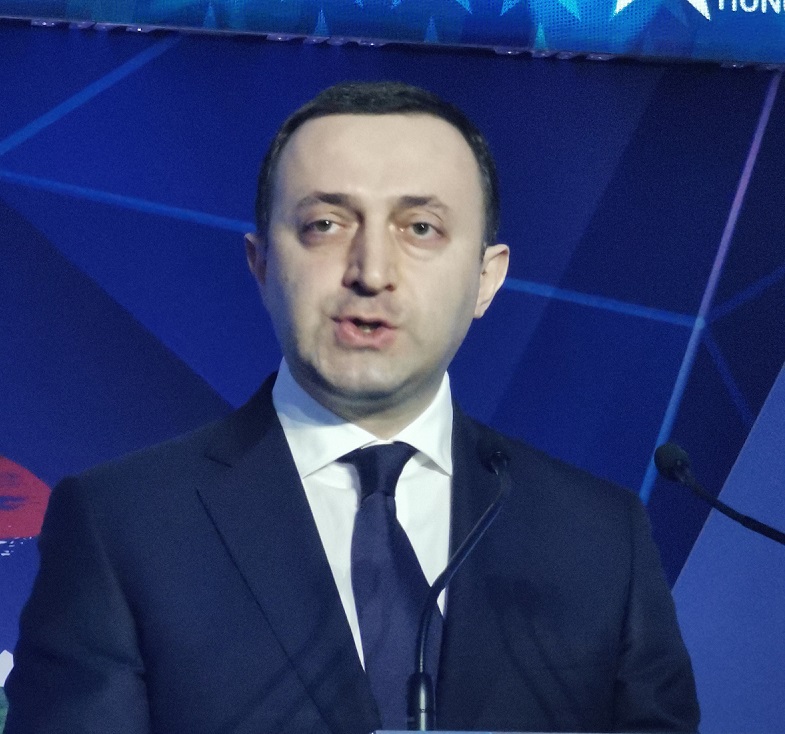Garibašvili, Moscow and new tensions over Tbilisi's EU membership
At the Bratislava Security Forum, the premier expression of the Georgian Dream backed the Kremlin's arguments on the war in Ukraine, heightening political tensions in the country. The campaign for the 2024 parliamentary elections looms as a crucial juncture in the confrontation between Russia and the West.
Tbilisi (AsiaNews) - Political tensions in Georgia have been extremely heightened in recent days due to a series of statements by Prime Minister Iraklij Garibašvili, a member of the Georgian Dream majority, made this time in Bratislava at the Global Security Forum.
He claimed that the cause of Russia's invasion was Kiev's desire to join NATO, a statement that many Georgian and European observers say indicates that the authorities in Tbilisi are now one step closer to rejecting European integration.
The premier's outings at international gatherings of late are like walks on a minefield. He constantly reminds us that before Ukraine, war had broken out in Georgia, and "no one had helped this little people," and now there are calls for sanctions against Russia, the opening of a second front, constantly igniting the already bitterly polarized debate in Georgian politics.
This time Garibašvili's words had the effect of setting off one of these mines, speaking of NATO's faults "the extent of which everyone is well aware of," using words of clarification that seemed dictated by the Kremlin.
Otherwise, the premier repeated the litany of recent months about the fact that the founder of his party, Bidzina Ivanišvili, "is not an oligarch, but a patron who saved Georgia from the dictatorship of Saakašvili and his National Movement."
Instead, thanks to the Georgian Dream, the country is now keeping away from war, enriching itself, and maintaining peace and stability through the efforts of the government, which intends to "achieve de-occupation through peaceful methods."
So in Georgia, according to Garibašvili, "a miracle happened, we set a precedent that should be an example for everyone, how not to be destroyed by turmoil and survive in a small country, which is not a member of NATO, while desiring to join Europe, but you have to know your way around."
Furthermore he promised that by June the Tbilisi government will meet the 12 demands of the EU, except evidently the first one, that of de-polarization of national politics.
Impatience with the opposition also clearly emerged when Šota Gvinirija, Georgia's former ambassador to the Netherlands, now a contributor to the Center for Economic Policy Research, who asked the premier at the Bratislava Forum about the possible consequences for Georgia of a defeat by Russia, "given the course of war operations."
Garibašvili, instead of answering the question, lashed out, "you are an opponent, a parody of an opponent who flew directly from Tbilisi to Bratislava to ask me a provocative question." In his view, the opposition should instead support the government, which is "doing everything possible to bring the country closer to Europe, defending national interests."
A French journalist then turned to the premier, observing that "you have just given us an example of polarization, can you better explain why you cannot get along?"
Garibašvili's reaction was described by the opponents themselves as a form of "blackmail and pretension": "If you want to avoid these scenes at the next Globalsec Forum, give us EU candidate status, give us status, and you will see an end to the polarization!" The entire official Georgian delegation snapped to its feet to thunderous applause.
The effects of these statements in Slovakia were new bitter verbal clashes in the Tbilisi parliament, where opposition deputies accused the prime minister of now being "a Kremlin propagandist."
Independent MP Khatia Dekanonidze called on the leaders of the Georgian Dream to come to their senses: "Garibašvili's speeches are identical to Moscow's theses, and there is no need to give the Russians any more reasons to attack sovereign countries... The refusal of NATO and the EU condemns us to negotiate with Russia for the return of occupied territories, and will end with Georgia's submission to the Kremlin dictatorship."
Several other speakers further pointed out that the election campaign for the 2024 parliamentarians will be a continuous escalation of accusations between the warring parties, and Georgia's fate will mark a decisive stage in the global confrontation between Russia and the West.
Photo: Elekes Andor/Wikimedia Commons
12/02/2016 15:14
04/10/2021 11:39







.png)










